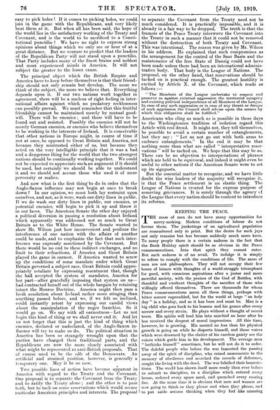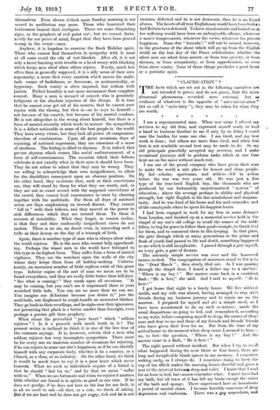KEEPING THE PEACE.
THE mass of men do not have many opportunities for merry-making. Modern conditions of labour do not favour them. The junketings of an agricultural population are remembered only in print. But the desire for such joys not only remains but has become suddenly much more keen. To many people there is a certain sadness in the fact that the Bank Holiday spirit should be so obvious in the Peace commemorations. Into that spirit they cannot enter. But such sadness is of no avail. To indulge it is simply to refuse to comply with the conditions of life. Tho mass of men are not philosophers. They will not occupy their few hours of leisure with thoughts of a world-struggle triumphant for good, with conscious aspirations after a juster and more merciful society, with the praises of the God of Battles, with thankful and exultant thoughts of the sacrifice of those who willingly offered themselves. There are thousands for whom Peace commemorations mean all these things, perhaps with bitter sorrow superadded, but for the world at large " an holy day " is a holiday, and so it has been and must be. Man is a big child who goes back to his lessons and his games after every sorrow and every strain. He plays without a thought of recent tears. His spirits will load him into mischief an hour after he has received the deepest of moral impressions. All this time, however, he is growing. His mental no loss than his physical growth is going on while ho disports himself, and those voices which were drowned by the clatter of his careless gaiety are the voices which guide him in his development. The average man " bethinks himself" sometimes, but he will not do it to order. The doleful people who before the war lamented the passing away of the spirit of discipline, who raised monuments to the memory of obedience and searched the records of deference, sought the living with the dead. The war falsified their lamenta- tions. The world has shown itself more ready than ever before to submit to discipline, to a discipline which entered every house, ordered every spare meal, and quenched every roaring fire. At the same time it is obvious that men and women are now going to think as they please and when they please, and to put aside serious thinking when they feel like amusing
themselves. Even eleien o'clock upon Sunday morning is not sacred to meditation any more. Those who lamented their lawlessness lament their irreligion. There are some disquieting signs, as the prophets of evil point out ; but we cannot, fortu- nately for our peace of mind, forget that they have been proved wrong in the event—once.
Anyhow, it is hopeless to exorcise the Bank Holiday spirit. Those who cannot find themselves in sympathy with it must
at all costs avoid the role of wet-blanket. After all, it is not only a heart bursting with trouble or a head weary with thinking which keeps man aloof when others rejoice. Rarely, much less often than is generally supposed, it is a silly sense of their own superiority, a sense that every emotion which moves the multi- tude comes of foolishness, or fierceness, or sentimentality, or
hypocrisy. Such vanity is often imputed, but seldom with justice. Perfect humility is not more uncommon than complete conceit. Many a man is accused of conceit who is genuinely indignant at the absolute injustice of the charge. It is true that he cannot ever get rid of his reserve, that he cannot ever rejoice with the throng, but that is—so ha says to himself— not because of his conceit, but because of his mental candour. He is not altogether in the wrong about himself, but there is a form of mental sincerity which tends to narrow the sympathies. It is a defect noticeable in some of the best people in the world.
They have every virtue, but they lack all power of compromise, therefore of combination. Upon all great occasions, days of rejoicing, of national expression, they are conscious of a sense of aloofness. The feeling is allied to shyness. It is, indeed, that greater shyness which comes, like social embarrassment, of a form of self-consciousness. The occasion which their fellows celebrate is not exactly what in their eyes it should have been.
They do not refuse to admit that they may be wrong. They are willing to acknowledge their own insignificance, to allow for the disabilities consequent upon an obscure position. On the other hand, they maintain that, such as their convictions are, they will stand by them for what they are worth, and, as they are not in exact accord with the supposed convictions of the crowd, they cannot lend countenance to error by cheering together with the multitude. For them all days of outward
union are-days emphasizing an inward dissent. They cannot
" fall in " with their fellows, and they marvel at the power to sink differences which they see around them. To them it savours of instability. What they forget, or cannot realize, is that they and their confessedly insignificant views do not matter. There is no sin, no deceit even, in concealing such a trifle as their heresy on the day of a triumph of faith.
Again, there is another type of man who is always silent when the world rejoices. He is the man who cannot help apprehend- ing. Perhaps the wisest men in the world have belonged to this type in its highest form. They suffer from a form of mental vigilance. They are the watchers upon the walls of the city whose duty keeps them from all holiday-making. Unfortu- nately, an enormous number of little replicas exist of this great typo. Inferior copies of the sort of man we mean are to be found everywhere, and they are really little better than kill-joys.
" See what is coming ! " they croak upon all occasions. " It may be coming, but you can't see it imprisoned there in your wretched little hole. You can see no more than we can see.
You imagine our ill-fortune because you desire it," jeer the multitude, not displeased to rough-handle an unwanted thinker.
They go back to their revellings, and he sighs over their ignorance, not perceiving that pluck is a better amulet than foresight, even perhaps a greater gift than prophecy.
What about the proverbial " poor heart " which " seldom rejoices " ? Is it a proverb with much truth in it ? The present writer is inclined to think it is one of the less true of the common sayings. It is, however, certain that a man who seldom rejoices has very incomplete sympathies. There must be for every one an immense number of occasions for rejoicing, if he can rejoice in some one else's happiness, or if he can identify himself with any corporate body, whether it be a country, or a Church, or a class, or an industry. On the other hand, we think it would be much truer to say it is a poor heart which never laments. What we each as individuals require of a friend is that he should " feel for us," and by that we mean " suffer with us." When we are fortunate and when we rejoice it matters little whether our friend is in spirits as good as our own. If he does not grudge, if he does not love us the less for our luck, it is all we need to ask—all that, as a rule, we think of asking. But if we are hurt and ho does not get angry, sick and he is not
anxious, defeated and he is not downcast, then he is no friend of ours. The hearts of all true Englishmen would have been broksa had Britain been defeated. To have stood outside and looked on at her suffering would have been an unforgivable offence, whatever a man's temperament, whatever his views, whatever his private happiness. Some due " hurrahs ! " will not be missed, however, in the greatness of the shout which will go up from the English world on the last day of the Peace celebrations, whether the silent men are silent from sorrow, or from true gravity, or from shyness, or from scrupulosity, or from apprehension, or even from sheer vanity. None of those things precludes a good heart or a patriotic spirit.



































 Previous page
Previous page